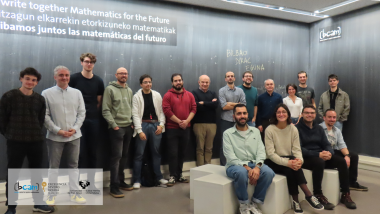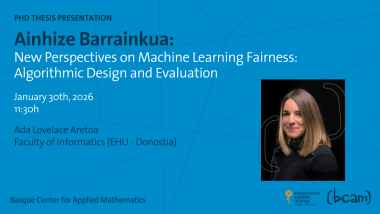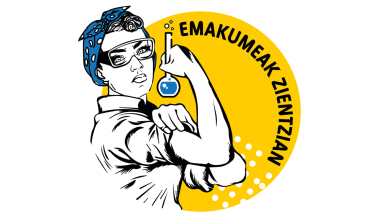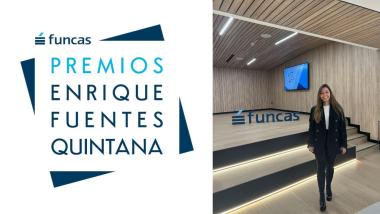Bidebarrieta Kulturgunea hosts a new edition of the series 'Mathematics in everyday life' -organized by BCAM, UPV/EHU and the City Council of Bilbao- on May 8, 15 and 22.
- This May 2025 marks the twenty-second edition of a classic cycle of mathematical dissemination at the Bidebarrieta Library, the lecture series Matematika eguneroko bizitzan/Matemáticas en la vida cotidiana, organized by the Bidebarrieta Library (Bilbao City Council), the Basque Center for Applied Mathematics and the University of the Basque Country.
This May 2025 marks the twenty-second edition of a classic cycle of mathematical dissemination at the Bidebarrieta Library, the lecture series Matematika eguneroko bizitzan/Matemáticas en la vida cotidiana, organized by the Bidebarrieta Library (Bilbao City Council), the Basque Center for Applied Mathematics and the University of the Basque Country. Mathematics is a fundamental part of our society, our culture and our daily life. It has been present in the history of humanity, its culture and its ideas. Mathematics is applied in other natural and social sciences, in engineering, in new technologies, in medicine, as well as in the different branches of knowledge. The economic, scientific and technological development of a country would be impossible without mathematics. Moreover, almost all the activities of our daily life “need”, even if they are hidden, mathematics: calling on a cell phone, using a digital camera, withdrawing money from a bank ATM, making a statistical study, watching television, using the computer or accessing the Internet, taking out insurance, investing or borrowing money, constructing the buildings in which we live, and so on... and a long etcetera.
The cycle aims to bring Mathematics and its reality closer to society in general. It is aimed at the widest possible audience (young people, adults, mothers and fathers, teachers, people with any kind of occupation, people with cultural concerns, people who hate mathematics, people who hate to learn mathematics, etc.).cultural concerns, people who hate mathematics, etc.), so that they become aware of the presence of mathematics in everyday life.
May 8, 2025 (7:00 PM): Mathematics × Mathematics, Marta Macho Stadler (UPV/EHU)
Abstract: When we refer to a mathematics specialist, most people are likely to picture a man. Even many individuals involved in science are unaware that some of the theorems they use in their research were proven by women. In this lecture, we will introduce several women mathematicians and their contributions to the advancement of this field. Whether professionals or self-taught, unknown or award-winning, all of them have played a significant role in the construction and dissemination of mathematical knowledge.
Personal Bio: Marta Macho Stadler is a professor at the University of the Basque Country (UPV/EHU) and holds a PhD in Mathematics from Claude Bernard University Lyon 1 (France). She is a specialist in topology. Deeply interested in science outreach, she has been involved for years in various activities at universities, scientific institutions, and cultural or educational centers. She is also the editor of the blog Mujeres con ciencia (Women in Science), part of the Chair of Scientific Culture at UPV/EHU.
In 2015, she was awarded one of the Medals of the Royal Spanish Mathematical Society. In 2016, she received the Emakunde Award “for her scientific career devoted to promoting and bringing mathematics and scientific knowledge closer to women, as well as for making the contributions of women scientists to academia and social progress visible and valued.” In 2019, she was named an Illustrious Citizen of Bilbao “for her work as a science communicator and for highlighting the role of women in science.” In 2023, she received the Lilly Foundation Science Outreach Award and the Muy Interesante magazine’s Women in Science (Outreach) Award.
May 15, 2025 (7:00 PM): Fractals Are Taking Over, Aniceto Murillo Mas (University of Málaga)
Abstract: For decades, the term "fractal"—and all it implies—has been used by scientists, doctors, architects, musicians, sculptors… However, the actual meaning and implications of the concept of a fractal are much less known and often surrounded by a certain mystery. In this talk, which will maintain a casual and accessible tone, we will try to strip fractal geometry of its enigmatic aura and present it as a powerful tool for both understanding natural phenomena and applying it in various fields of science and art.
Personal Bio: Aniceto Murillo Mas is a Professor of Geometry and Topology at the University of Málaga. He has carried out research stays at prestigious institutions both in Spain and abroad. He is an internationally recognized researcher in the field of algebraic topology and the author of numerous publications in high-impact scientific journals. He has also been awarded the prestigious international Ferran Sunyer i Balaguer Research Prize. In the field of science outreach, he has given talks at numerous events organized by leading institutions, and he is passionate about the not always easy task of communicating mathematics to broader audiences.
May 22, 2025 (7:00 PM): Knots, Braids, and Other Mathematical Entanglements, Marithania Silvero Casanova (University of Seville)
Abstract: Knots have been a fundamental part of many cultures and are present in numerous aspects of our daily lives—from decorative knots to those used by surgeons, sailors, and climbers. This session is dedicated to mathematical knots and the branch of mathematics that studies them: knot theory.
When thinking about knots, we can ask ourselves a few questions: Is there a catalogue of knots? How many different knots can we find? If we have a knotted rope, is it possible to untie it without using scissors? In this session, we will answer these questions and share some fascinating facts about knots and braids.
Personal Bio: Marithania Silvero Casanova is an Associate Professor in the Department of Algebra at the University of Seville. She holds a PhD in Mathematics from the same university. She has conducted research at George Washington University, the Polish Academy of Sciences, and the University of the Basque Country (UPV/EHU).
Her research focuses on knot theory. She was awarded the 2019 Vicent Caselles Prize by the Royal Spanish Mathematical Society and the BBVA Foundation for solving the Kauffman Conjecture, posed by Louis H. Kauffman in 1983. She also received the Young Researchers Award from the Academy of Sciences, Arts and Letters of Huelva (2020), and the Young Researchers Award from the Royal Cavalry Armory of Seville (2024). She has given over a hundred talks on her research in institutions across various countries and has organized more than a dozen national and international conferences. She is currently a member of the Scientific Committee of the Royal Spanish Mathematical Society.
Related news




